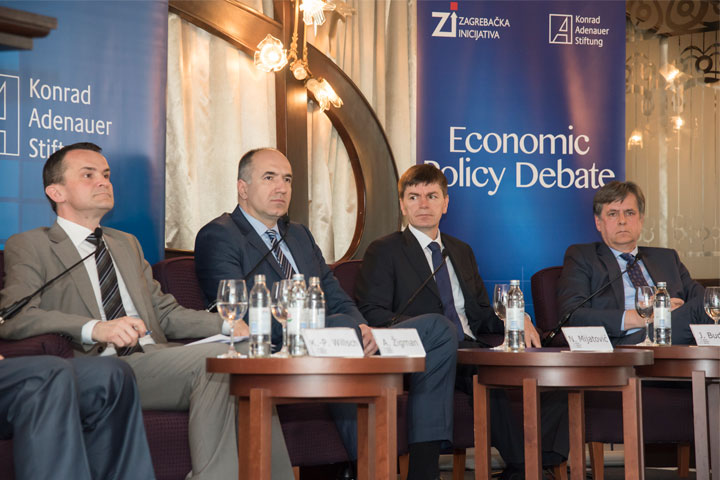
The participants of the round table on the topic of "New economic and fiscal policy for Croatia", organised by Zagreb Initiative and the Konrad Adenauer Foundation and held on 13 April 2016 in Zagreb, included many eminent experts in the field of economics, politics, economy and education, among whom Ante Žigman, Ph.D., Senior Advisor at the Office of the Governor.
During the panel discussion, Mr Žigman emphasised that the Croatian National Bank had contributed to financial stability in the crisis period because of its pre-crisis restrictive monetary policy and that the CNB's current expansionary monetary policy could not be a magic wand that, without structural reforms, would resolve Croatia's problems. He sees the fiscal policy as stagnating over a longer period of time, lacking permanent efforts on or contribution to structural reforms. Mr Žigman announced the continuation of structural repo operations, as an additional monetary policy stimulus to the economic growth, which may even be more intensified, but under the condition that Government's structural reforms are also initiated.
Hrvoje Stojić, Economic Research Director at Hypo Alpe-Adria-Bank, delivered the first presentation after the introductory welcoming speeches by Michael A. Lange, Ph.D., the representative of the Konrad Adenauer Foundation and Prof. Mladen Vedriš, Ph.D., Vice President of Zagreb Initiative. Expectations for Croatia are positive, the tourist season might contribute to the growth rate even exceeding 1%, the share of exports in the GDP will increase by 15%, positive trends in industrial production have been recorded, which continue in 2016, developments in competitiveness are positive, the balance of payments is in surplus and the deleveraging trend has slowed down. In the next two years, a stronger financial consolidation is expected, and a budget supported by structural reforms that will accelerate growth is expected next year. Mr. Stojić assessed the Croatian National Bank as a partner and guarantor of stability and said that the CNB reacts to any negative occurrences in a timely manner, so that kuna has almost been unaffected despite volatilities in the financial markets.
The key speaker, Klaus-Peter Willsch, a Member of the Committee on Economic Affairs and Energy of the German Bundestag, used the example of Germany to explain that sometimes even unpopular and painful reforms and cuts are necessary to boost the economy and enhance growth. At the start of the 21st century, Germany was often called "the sick man of Europe" and today it is the number one economic power and the engine for other countries in Europe, Willsch said. He also pointed out that real economic reforms are crucial and that nobody can escape the need for reforms. He encouraged Croatian politicians to enable stable reforms and stop wasting time on the illusion that the accession to the European Union brings improvement without any need to invest our own efforts.
The participants of the panel discussion that followed, in addition to Mr Žigman, included Prof. Nikola Mijatović Ph.D. of the Faculty of Law of Zagreb, Prof. Damir Novotny, Ph.D. Partner to T&MC Group, Mr Josip Budimir, Member of the Management Board of Franck d.d. and Tomislav Ćorić, Ph.D., Assistant Professor at the Faculty of Economics and Business in Zagreb. Some of the topics included changes in the tax system, fiscal consolidation, reforms, the Croatian economy, youth emigration and education.
